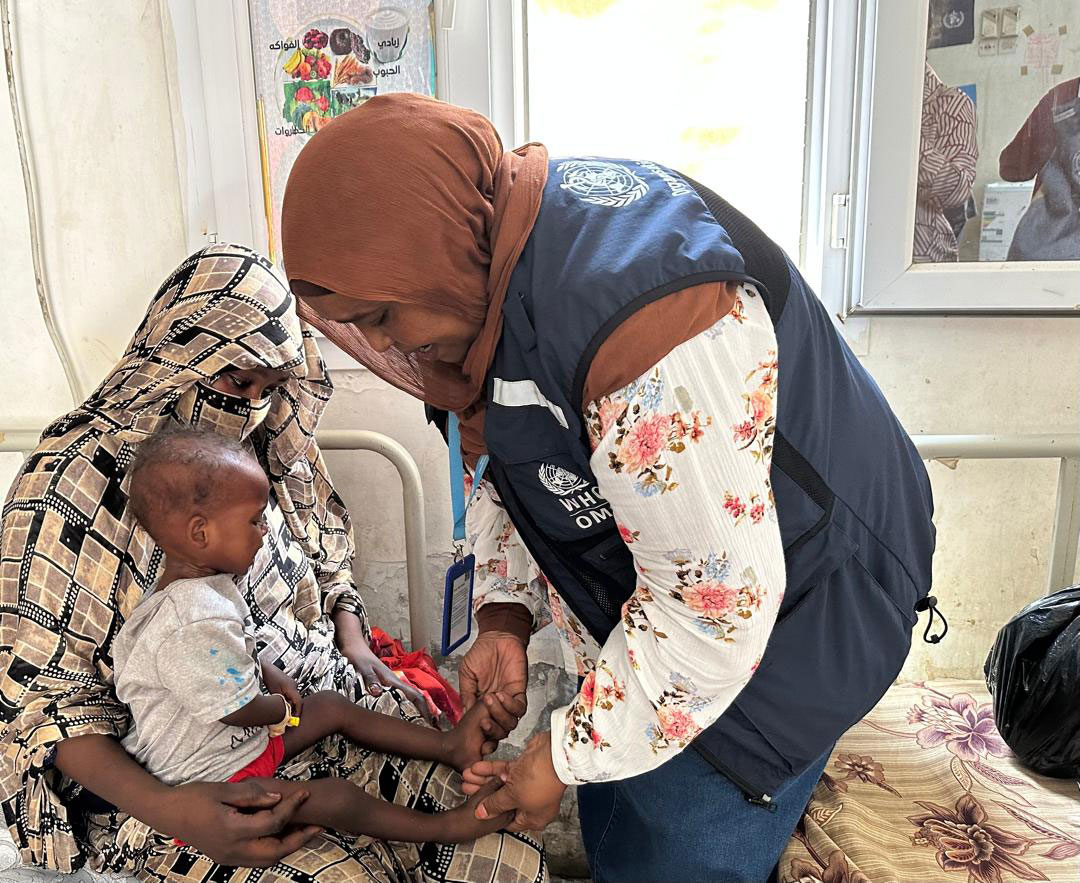 WHO Sudan nutrition officer Sara Ebed checks on Aysha, a patient at Port Sudan Stabilization Centre. Photo credit: WHO/ Loza M Tesfaye
WHO Sudan nutrition officer Sara Ebed checks on Aysha, a patient at Port Sudan Stabilization Centre. Photo credit: WHO/ Loza M Tesfaye
Aysha’s story
20 August 2025, Port Sudan, Sudan – Aziza Jebrellah sits on a hospital bed in Port Sudan Paediatric Hospital, gently comforting her 18-month-old daughter Aysha who has been admitted to the stabilization centre for severe acute malnutrition (SAM) with medical complications.
Aziza was displaced with her family from Khartoum when conflict erupted 2 years ago, fleeing first to Kassala, then moving to Port Sudan where she now lives with relatives.
Aysha had been sick with diarrhoea and fever for about 2 weeks before her family brought her to the stabilization centre. They decided to take her to the hospital when she stopped eating and appeared to be slipping away before their eyes. “When she refused to even taste anything and kept getting weaker, I was afraid I would lose her,” Aziza says. “Now I have hope that she will recover.”
Within 3 days of her admission to the stabilization centre Aysha began showing signs of improvement. Her appetite was slowly returning and she had gained a few grams. A small increase, but still a positive step towards recovery.
“WHO support to nutrition stabilization centres ensures children like Aysha can be saved through timely medical care. This is what keeps me going and gives meaning to my work,” says WHO Sudan Nutrition Officer Sara Ebed.
The stabilization centre uses therapeutic milk, essential medicines and medical supplies provided by WHO to manage SAM and its medical complications. Children admitted to the centre are monitored around the clock and improvements carefully documented. Once they recover from medical complications they are referred to the outpatient care programme for SAM without medical complications where they receive nutritious food and supplements through outpatient care managed by nutrition partners. Mothers receive food and cleaning items, creating a space for them to focus on caring for their child, and are provided with counselling on infant and young child feeding to continue care at home.
Driven by conflict, displacement and the consequent poor access to nutrition, over 770 000 children in Sudan are suffering from SAM, 116 800 of whom develop life-threatening medical complications.
WHO provides technical support and distributes nutrition supplies to 142 stabilization centres across Sudan and provides direct operational support to 47 stabilization centres. So far this year, close to 20 000 severely acute malnourished children with medical complications have been treated through WHO technical and supply chain assistance.





